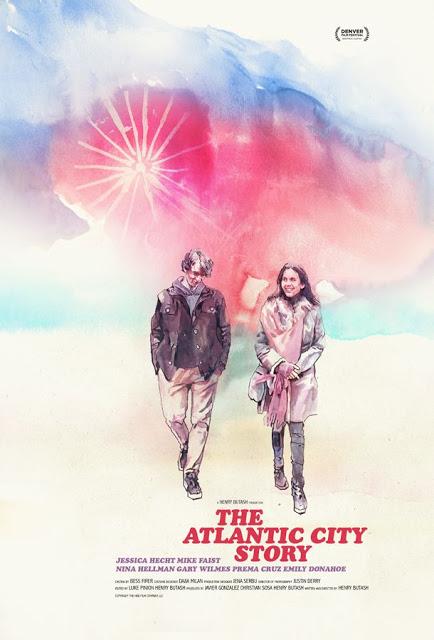
There are films that begin to mesmerize a viewer when you watch the initial sequence closely. This is often the case when you view a debut film that is also built on an original script written by its director. The quiet sophisticated strength of the opening sequence of Henry Butash’s debut film The Atlantic City Story will grab the attention of any mature, attentive viewer and the viewer is likely to be hooked until the film ends. This critic recalls the same feeling while viewing the opening sequence of the British director Sir Ridley Scott’s debut film The Duellists which went on to win the Cannes film festival Best Debut Film award in 1977, Scott’s sole honor at Cannes to date. Similar to The Duellists, Henry Butash’s film, too, has an opening sequence where the spoken conversation is minimal, and even the lead actress Jessica Hecht playing a middle-aged married woman called Jane (an appropriate name for the character) hardly moves from a table where she is sitting and drinking her morning hot beverage, as her husband greets her fleetingly and rushes off to work. Her posture, the lighting and the camera almost mimics a static shot providing some introductory information for what is to follow. A regular Hollywood studio film would never allow for such a minimalist opening sequence as in Butash’s The Atlantic City Story. These are aspects that regular filmgoers used to loud music and fast action sequences would perhaps discount. This is probably why The Duellists is rarely discussed even today among Ridley Scott’s works even though Cannes spotted its value ignoring his blockbuster films that he made in his later career.
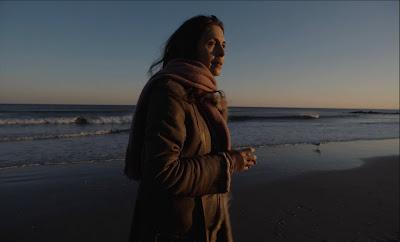
Taking a break from her cheating husband:
Jane (Jessica Hecht) at Atlantic City on
the shores of the Atlantic Ocean
Those who have visited Atlantic City, New Jersey, USA, in recent decades could anticipate a socio-historic story of the gambling hub on the Atlantic coast especially in winter months when the numbers of visitors dwindle. The wooden boardwalk parallel to the ocean shore would be empty in winter and but crowded in summer. Butash’s film captures the winter scenario with the boardwalks almost empty though the casinos work quite in contrast without a break with sufficient numbers of customers gambling away night and day just as they do in Las Vegas. The only difference: Atlantic City, seems to be on the decline while Las Vegas appears to be unaffected with time.
However, Butash’s film is not about the City as it prefers to focus on the story of two lonely individuals, Jane and Arthur (Mike Faist), who accidently converge on the city for different reasons at almost the same time. Jane is a married woman with sufficient money to spend and wants to spend time anonymously away from her husband, who she suspects is having an affair with another woman. Arthur, the other individual, is a young bachelor, considerably younger than Jane, who has stolen money and an engagement ring from his family members and is possessed by an urge to compulsively gamble. Atlantic City offers the anonymity and escape that Jane briefly desires, and for Arthur the false hopes of becoming rich and hopefully returning the stolen money to the family he so loves. Jane and Arthur, total strangers, meet in that somewhat less-crowded-than-usual Atlantic City.
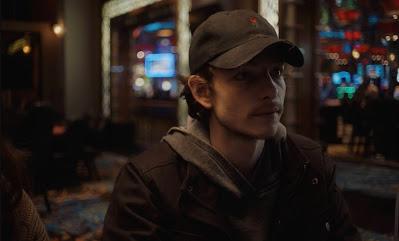
Arthur (Mike Faist) gambling with money
stolen from his family
Jane is initially attracted to Arthur by merely watching his hands on the roulette table. Jane notices that Arthur is losing money and is gradually becoming penniless. Jane follows and discovers him alone one night all wet on the seashore and suspects that he has no place to go and as a kind soul brings him to her room. A bond forges between the two as they spend time in the empty exteriors of Atlantic City over the next few days. Director Butash had worked on three recent films of Terrence Malick (as post-production assistant in Knight of Cups and Song to Song and as an additional editor for his Voyage of Time). It is therefore not surprising that certain exterior sequences of Jane and Arthur in Atlantic City remind the viewer of Malick’s style of the ballet-like camera movements capturing the almost silent duo (bereft of Malick’s usual voice overs and religious philosophy) conversing only briefly. Butash invests considerable screen time focusing on their body language and that results in better dividends than films that rely on lengthy spoken dialogues. That’s what makes Butash’s film stand out from most other films.
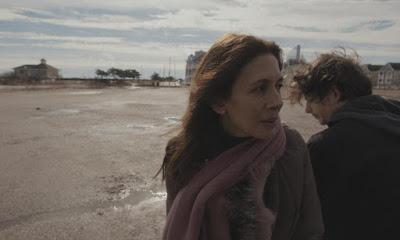
Butash and cinematographer Derry creating images
akin to works of Malick and cinematographer Lubezki
If the viewer is familiar with a particular work of the Russian playwright and short story writer Anton Chekov, The Atlantic City Story would recall elements of Chekov’s short story The Lady with a Dog. That short story dealt with an unhappily married woman, on a vacation (alone with a dog and without her husband) walking up and down a walkway on the shores of the Black Sea meeting up with a lonely married banker for the first time, while passing each other. The Chekov story was adapted into a wonderful 1960 Russian film directed by Iosif Kheifits with the same title as the story and had officially participated in the Cannes Film Festival that year. Cineastes who have watched the Kheifits film will note the common strains with Butash’s film. The boardwalk of Atlantic City next to the Atlantic Ocean shore is similar to the walkway in Kheifits film next to the Black Sea shore. The main characters of both films include married persons who indulge in a brief extra-marital tryst before departing to their respective homes. But the common elements of the two films end there.
Butash’s script does not adapt Chekov’s story any further but instead looks at the brief tryst of Jane and Arthur as a medicine to heal their personal psychological wounds. The ending of Butash’s tale is considerably different from Chekov’s tale. Jane being elder to Arthur notices Arthur’s dangerous gambling addiction and proactively comes up with a solution to help him on the right path and return to his family. Jane is able to reflect on her own life and marriage and resolve that fracture too in an interesting way.
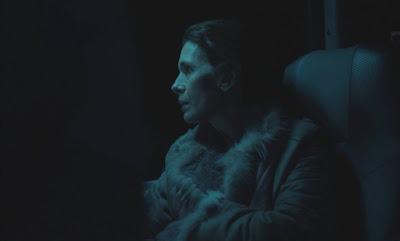
Jane: Escaping a fractured marriage,
or repairing it with a short absence?
The admirable aspect of Butash’s original script is in contrasting Atlantic City as a haven for tourists and compulsive gamblers, against those rare well-meaning visitors who could go out of the way to help a compulsive gambler to seek a new productive life and even encourage that person to consider joining Gamblers Anonymous. The script is also admirable because the director/scriptwriter positively focused on saving crumbling marriages and broken family ties set against a bleak backdrop of empty stores and almost empty sandwich outlets that had attracted Arthur’s parents in the past when they visited Atlantic City decades ago enabling Arthur to recall the sumptuous sandwiches of the outlet from memory.
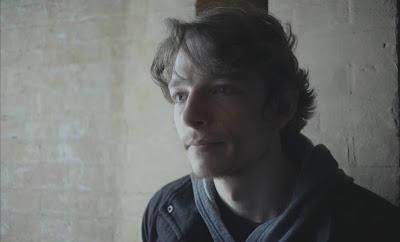
Arthur's life is changed by
a well-intentioned stranger
Pivotal to The Atlantic City Story is actress Jessica Hecht, who has very few lines to speak and yet dominates the screen fleshing out the character that Butash had created. Butash cleverly zeroed in on Ms Hecht possibly to extract a credible low-key but mature performance required of the character. Similarly, cinematographer Justin Derry’s outdoor cinematography is magical at times and quite possibly influenced by the work of cinematographer Emmanuel Lubezki in several of Terrence Malick’s later films.
Henry Butash has made a commendable debut film that offers restrained entertainment and thoughtful and positive outcomes with a difference that independent cinema can offer in USA. One hopes the debut film of Mr Butash will sow the seeds for a similar growth trajectory as the debut film of Sir Ridley Scott did for Sir Ridley.
P.S. The Atlantic City Story is making its debut at the 2020 Denver Film Festival, USA, and is nominated for the Best American Independent Film Award. Ridley Scott’s debut film The Duellistsand Terrence Malick’s Knight of Cups mentioned above have been reviewed earlier on this blog. (Click on the names of the films in the post-script to access the reviews.)

